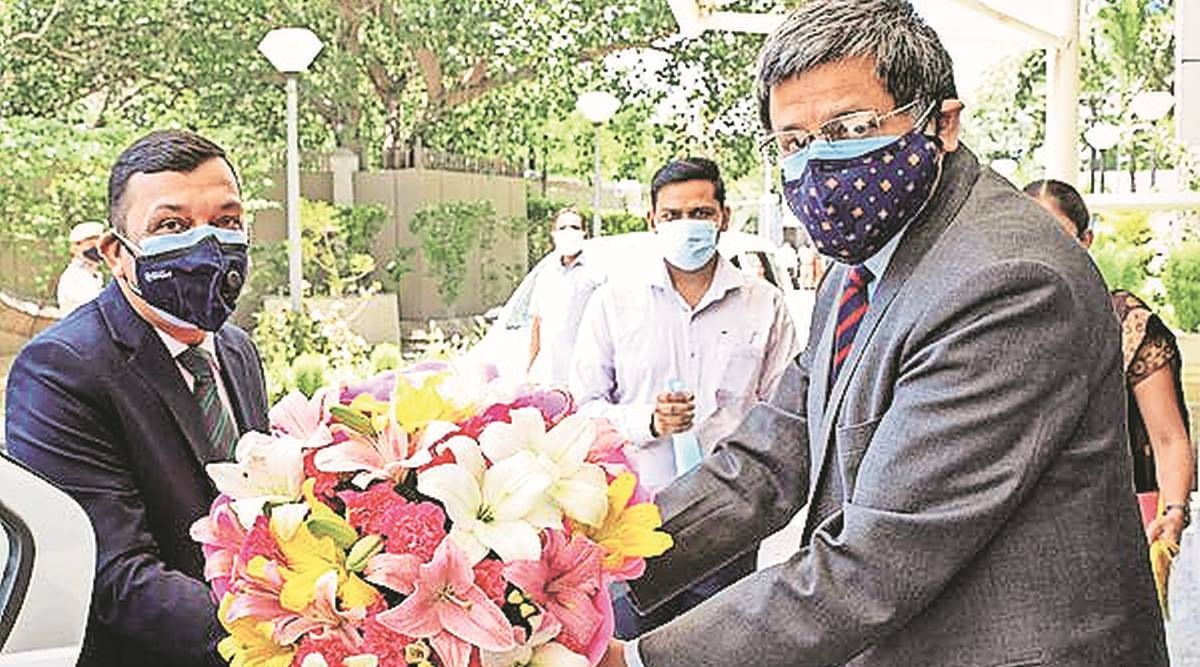 Subodh Jaiswal felicitated after taking over as director of CBI in New Delhi. (PTI)
Subodh Jaiswal felicitated after taking over as director of CBI in New Delhi. (PTI) Former state DGP Subodh Kumar Jaiswal, who took charge as the CBI chief on Wednesday, is the third IPS officer from Maharashtra cadre to be heading the premier investigating agency.
John Lobo and Mohan Katre are the other two officers from the Maharashtra cadre who had headed the agency. When he was DCP (Crime) in Mumbai, Navy officer Kavas Nanavati had surrendered to Lobo in 1959 and confessed to the murder of his wife’s lover, in what became the famous Nanavati case.
“In 1964, the Goa-born Lobo had moved to CBI as the superintendent and barring a short tenure with the Intelligence Bureau, he had remained with CBI and retired as the director,” police historian Deepak Rao told The Indian Express. After Lobo passed away in 2017, former Mumbai Police commissioner Julio Ribeiro had called him “one of the three most remembered cops in CBI”.
In 1985, 1952-batch IPS officer Mohan Katre had become the CBI director when Rajiv Gandhi was the Prime Minister. It fell on him to investigate the Bofors case. Katre, who was Special IG (Law and Order) in Maharashtra before moving to the CBI, also oversaw the probe into the assassination of General Arunkumar Vaidya by Khalistani militants. A senior IPS officer said, “There have been other Maharashtra cadre officers who have held senior positions in the CBI but there were only two directors prior to Jaiswal.”
Jaiswal, whose differences with Maharashtra’s Maha Vikas Aghadi government were no secret, will be overseeing the investigation of corruption allegations made by former Mumbai Police commissioner Param Bir Singh against former state home minister Anil Deshmukh. As DGP, Jaiswal had expressed unhappiness over the “intense lobbying” by IPS officers with Deshmukh for postings.
But fellow IPS officers in the state said Jaiswal was a “thorough professional” and not the kind to let his “prejudices” come in the way of carrying out his duties. “I don’t think he will be guided by prejudices. He is mature and will go by the book,’’ said Arup Patnaik, former Mumbai Police commissioner while describing Jaiswal as “straight and upright”.
Patnaik recalled that as additional commissioner of central Mumbai in 2005, Jaiswal had managed to effectively defuse tensions during a clash between supporters of Shiv Sena and Narayan Rane, then with Shiv Sena. “Uddhav Thackeray came to the police station and Subodh defused the situation,” he said.
Another former IPS officer and a batchmate of Jaiswal, Y P Singh, described him as “honest and an absolute professional”. Asked how his appointment would impact cases in Maharashtra, he said, “I don’t think he will be governed by prejudices and go on a hunting spree. He will go by merits but he is tough.”
A state home department official said that fearing that the agency could be “misused” by the Centre, the Maharashtra government had withdrawn general consent to CBI in 2020. “The CBI cannot register any new cases in Maharashtra without obtaining consent from the state government. It can only register cases when directed by the courts. Even the FIR in the Deshmukh case was registered after the Bombay High Court directed the CBI to investigate the matter,” the official added.
When contacted, Congress spokesperson Sachin Sawant said, “The CBI has lost its glory during Modi rule. While wishing Jaiswal the best since he is from the Maharashtra cade, we expect him to raise the standard of CBI and not let the institution be run on the basis of Modi government’s political agenda against the Opposition.’’
Apart from the Deshmukh case, actor Sushant Singh Rajput’s alleged murder case, which it had taken over from the Bihar Police, is also being probed by the CBI. After early investigations immediately after being given the charge of the case, CBI seems to have pushed it to the back burner and has remained tight lipped about its own findings as to the cause of the actor’s death. A medical assessment conducted at AIIMS in New Delhi had said that Rajput had died by suicide.
- The Indian Express website has been rated GREEN for its credibility and trustworthiness by Newsguard, a global service that rates news sources for their journalistic standards.

